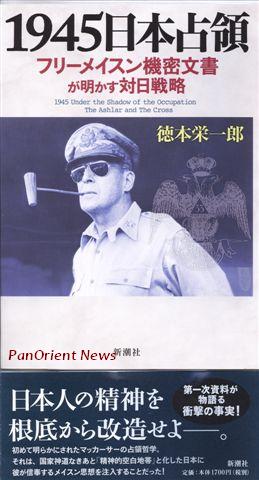|
|
Op-Ed
New Book Sheds Light on the Postwar Struggle for Japan’s Spirit
Wednesday, July 20, 2011

Tokyo- (PanOrient News) In the wake of the destruction of the Japanese empire and its surrender in August 1945, a “spiritual vacuum” emerged that the country’s de-facto ruler, General Douglas MacArthur, sought to fill with religion and philosophical ideas still new to Japan, from Christianity to Freemasonry.
While MacArthur, a devout Episcopalian and an active Mason, tried to promote Freemasonry, Emperor Hirohito was seeking closer ties with the Vatican. The Holy See, well known for its hostility to Freemasonry, was competing with the brotherhood to export its own influences to postwar Japan.
This competition for the spirit of a defeated nation is the focus of a new book about the 1945-1952 Occupation of Japan by author and investigative journalist Eiichiro Tokumoto. In “1945 Under the Shadow of the Occupation: The Ashlar and The Cross”* Tokumoto documents MacArthur’s efforts to persuade missionaries to intensify their efforts among the Japanese population in hopes of providing a counterweight to the growing appeal of communism in the nascent years of the Cold War.
Tokumoto’s book was researched from various declassified documents obtained in the U.S., Europe and Asia. Among them was a report of meeting between MacArthur and two American Catholic bishops, John F. O’Hara and Michael J. Ready, in the summer of 1946.
After a three-week trip around Japan, in which they met with religious and political leaders as well as Imperial Family members, the bishops reported to the Vatican that MacArthur encouraged the Catholic Church to attempt to convert the Japanese en masse.
“General MacArthur asked us to urge the sending of thousands of Catholic Missionaries - at once,” they reported. “He said: ‘you have a year in which to turn the mind of the Japanese people to the Catholic Church. A great vacuum has been created by the defeat of the Japanese, a spiritual vacuum into which anything may rush.”
According to the bishops, MacArthur, from his experience in the Philippines, believed that the Catholic Church held particular appeal to the Japanese because the tradition of seeking absolution “appeals to the Oriental.”
MacArthur reiterated his interest in encouraging mass conversions during the visit of Australian cardinal Norman Gilroy and bishop Thomas McCabe from late November 1946. The priests sent a report to the Vatican, which showed MacArthur’s anti-communist strategy was behind the proposal.
“The General is fearful that if the Church does not quickly send an army of zealous Missionaries to Japan, Communist agents will obtain the converts who should be gained by the Church,” they wrote.
The Holy See shared this view. In a memorandum entitled “Missions in Japan” dated November 9, 1946, the Vatican Secretariat of State said that the situation favored the Catholic Church. “The future of the Japanese cannot be left in the hands of the Protestants, who have already begun a widespread and varied work of propaganda, nor in the hands of the communists who will profit by the sad state of economic affairs to spread their pernicious theories.”
The records also indicate that Emperor Hirohito was seeking closer ties with Pope Pius XII, and the two had exchanged messages via third parties. The Pope had been instrumental in the release of some Japanese POWs and obtaining amnesty for accused war criminals.
Meanwhile, MacArthur tried to promote Freemasonry, which had been suppressed during the war. In a message to Japan’s Masonic organization in 1949, he said “In the progressive revival of the work of the Masonic bodies in Japan since the surrender has been found one of the strong spiritual bulwarks supporting the Occupation. For from those immutable precepts common to Christianity, to democracy, and to freemasonry has emerged the philosophy underlying Occupation policy”
MacArthur was made a Master Mason in January 1936 in Manila, where he was then the field marshal of the Philippine Army. His membership record states that the general was conferred with the honorary 33rd degree of the Scottish Rite in December 1947 at the American embassy in Tokyo.
Among MacArthur’s senior aides was Rear Admiral Benton W. Decker, Commander of the Yokosuka Naval Base, who opened several Masonic lodges. He wrote in a letter to an overseas Masonic lodge:
“Under the wise and benevolent leadership of General MacArthur, defeated Japan has found new hope. The Occupation has given that benighted country the start toward a Christian culture and a democratic form of government…I have energetically and loyally followed the policies of my superior officer and brother Mason, General MacArthur, who has always been guided by Christian principles and the tenets of Free Masonry”
Among the first generation of Japanese Masons in the postwar period were members of the Japanese Parliament, or Diet, including Ichiro Hatoyama, who became prime minister, as well as businessmen and even a member of the imperial family, Prince Higashikuni Naruhiko, uncle of the Emperor
As author Tokumoto explains, “In 1945, Japanese underwent a complete collapse of faith – in their invincible military, and in the emperor system, one part of which was the religion propagated as ‘State Shinto’”
“MacArthur was very interested in the relationship between politics and religion in Japan, and he wanted both to reform the thinking and ideology of the Japanese people as well as [make] sure that communism did not fill the gap in people’s mind and hearts,” Tokumoto adds.
* [Japanese title: Ichikyuyongo, Nihon senryo — furiimeisun kimitsu bunsho ga akasu tainichi senryaku. Author: Eiichiro Tokumoto. Published by Shinshosha; 341 pages]
PanOrient News
© PanOrient News All Rights Reserved.
|
|

